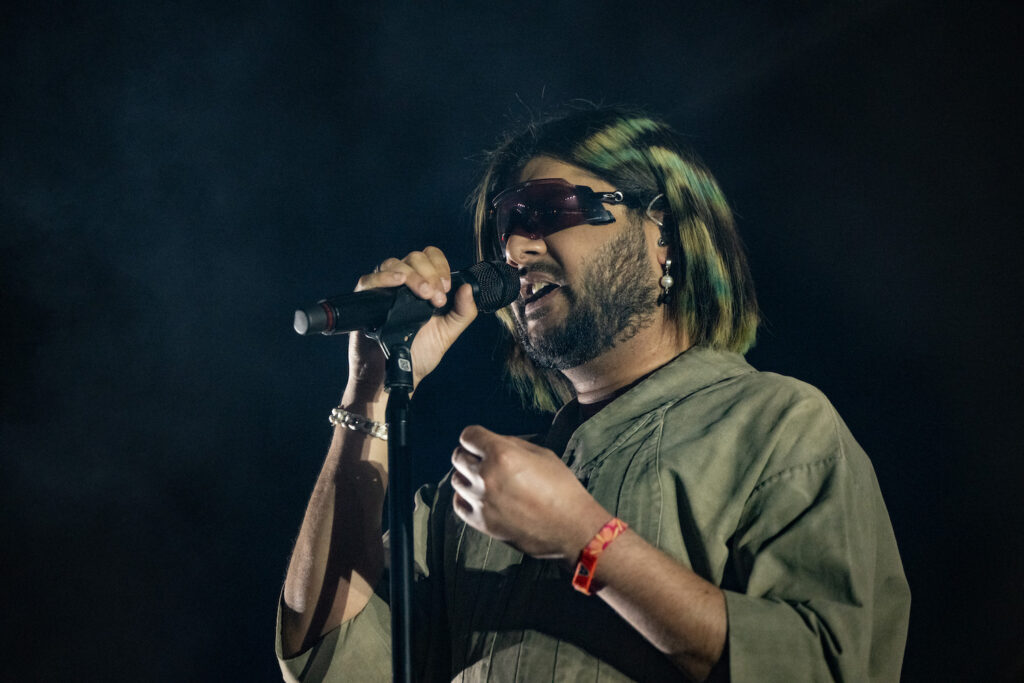10 Years and 30 Minutes Later, Jai Paul is Right on Time


Photo by Scott Dudelson via Getty Images for Coachella.
Jai Paul saunters on stage like he’s been there before. He hadn’t. At least, not in this capacity. And nothing but maybe a tinge of initial shyness would have you believe this is the first headlining performance of the reclusive British producer and singer’s career.
It’s Tuesday night at the Knockdown Center in whichever borough claims the endless warehouse and garage sprawl of Maspeth, just a few days after concluding a two-weekend live debut on the largest stage imaginable at Coachella. This 50,000-square-foot compound has housed glass and door factories at different points in the last century. But tonight it would serve as sacred ground for a revival 10 years deferred.
Paul was heralded out the gate. After releasing a pair of singles in the early 2010s — the rugged and rubbery electronica of “BTSTU” and “Jasmine (Demo),” a once-in-a-generation funk anthem with urgency and endurance — the buzz set in quick. And he played the internet better than most, leaving little if any digital trail save for a 2011 interview, which remains the only press he’s ever done. Instead of flooding the new trenches of the web, Paul’s approach was a gradual drip. But after years of writing and recording what he’d intended to be his proper introduction, the internet broke Jai Paul.
In 2013, a collection of incomplete sketches and demos were uploaded to a fake Bandcamp account as the artist’s debut album. Outlets ran with it, retracted it, and even lent credence to the theory that Paul himself was behind the leak. Though the link was pulled down within a day, the damage was done. Whatever trajectories those ideas — and his career — may have had were instantly altered. Paul dispelled the officialness of the album in his first and only tweet until 2019, when he generously released two new songs along with a detailed account of what transpired in 2013 and the years since. “The hardest thing to grasp was that I’d been denied the opportunity to finish my work and share it in its best possible form. I believe it’s important for artists as creators to have some control over the way in which their work is presented, at a time that they consider it complete and ready,” Paul wrote in a lengthy statement accompanying the singles “He” and “Do You Love Her Now,” adding how he’d grown exceedingly distrustful as a result.
For those who witnessed the rise and suspected collapse of Paul’s arch in realtime, seeing the producer gently step from the wings to center stage on Tuesday night was watershed material. An artist scorned by the internet was finally prepared to lead a somewhat public life, but on his own terms. Chief among them; canonizing the unsanctioned material that defined a dark decade of sparse dispatches.
Paul answered the roar of roughly 2,000 fans with an opening apology. “Sorry I’m late. What’s another 30 minutes after 10 years?” the producer smirked, keenly aware of the crowd’s anticipation and how to test it. Backed by siblings Rocco and Fabiana Palladino (children of Soulquarian bassist, Pino Palladino,) on bass and keys, as well as Isaac Kizito on drums, and his own brother, A.K. Paul, on guitar, Paul dove into the hour-ish set with a jolt of pop-fueled funk, weaving from “Crush” into a dialed-down and rippling version of “All Night.” From there, it was a one-two punch of purple party music with “Good Time” and “Genevieve” resonating in precisely the setting they were seemingly designed for.
Though the band is mostly air-tight and it’s evident care has been put into strategically extending songs with rumbling reprisals and ferocious funk vamp, it’s Paul’s voice — pristine, powerful, and composed — that consistently cuts through the Knockdown Center’s troubled sound system (a hurdle he hopefully won’t have to leap during tomorrow night’s set at Brooklyn Steel.) Performing his (relatively) recent singles, Paul’s mastery and confidence as a singer were in full focus, gliding through the spacious, paisley-specked ballad, “He,” and ramping back up on “Do You Love Her Now.”
From this writer’s corner of the crowd, the scale seemed to tip about three-quarters of the way through the set as the driving guitar lick of “Jasmine” snapped a brief pause in the sequence. The fuzz of A.K.’s frisky riffing washed over an audience waiting on that exact moment, exultantly affirming how hard we’ve caped for an R&B crusader we were never entirely sure would return. The set winds down with another old haunt, as the Drake-less original artifact of “BTSTU” barrels through the speakers, bringing new meaning to a line Paul wrote in 2007. “I know I’ve been gone a long time, but I’m back and I want what is mine,” Paul sings over assaulting synth runs and hyper-swung drum programs. It felt like one then, but, now, it’s categorically a battle cry.
The set truly closes with “Str8 Outta Mumbai,” a potently spirited Bollywood-sampling pop experiment with an almost laughably simple and infectious melody. For an artist who seems reluctant to feed into any expectations fans might have, it was a clever way to call it. Better to leave them on a high, then meet them in the low. As if to suggest his work, much like the bulk of the material comprising the night’s performance, remains unfinished. And despite the delay, the reclamation of his narrative is right on time and as resonant as ever.







